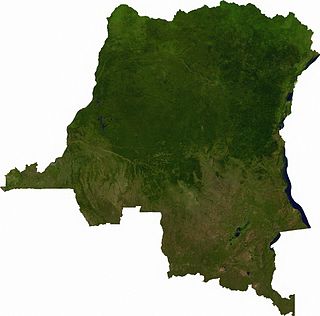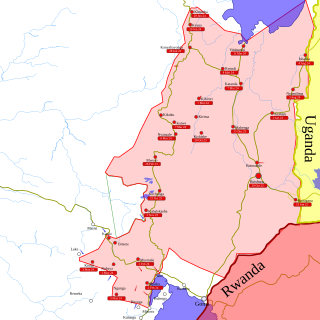Related Research Articles

Politics of the Democratic Republic of Congo take place in the framework of a republic in transition from a civil war to a semi-presidential republic.

South Kivu is one of 26 provinces of the Democratic Republic of the Congo (DRC). Its capital is Bukavu.

Bukavu is a city in eastern Democratic Republic of the Congo (DRC), lying at the extreme south-western edge of Lake Kivu, west of Cyangugu in Rwanda, and separated from it by the outlet of the Ruzizi River. It is the capital of the South Kivu Province and as of 2012 it had an estimated population of 806,940.

The Second Congo War, also known as Africa's World War or the Great War of Africa, was a major conflict that began on 2 August 1998 in the Democratic Republic of the Congo (DRC), just over a year after the First Congo War. The war initially erupted when Congolese president Laurent-Désiré Kabila turned against his former allies from Rwanda and Uganda, who had helped him seize power. Eventually, the conflict expanded, drawing in nine African nations and approximately 25 armed groups, making it one of the largest wars in African history.

Goma is the capital and largest city of the North Kivu Province in the eastern region of the Democratic Republic of the Congo. It is located on the northern shore of Lake Kivu and shares borders with Bukumu Chiefdom to the north, Rwanda to the east and Masisi Territory to the west. The city lies in the Albertine Rift, the western branch of the East African Rift, and is only 13–18 km (8.1–11.2 mi) south of the active volcano Mount Nyiragongo. With an approximate area of 75.72 km2 (29.24 sq mi), the city has an estimated population of nearly 2 million people according to the 2022 census.

Gisenyi, historically rendered as Kisenyi, is the second largest city in Rwanda, located in the Rubavu district in Rwanda's Western Province. Gisenyi is contiguous with Goma, the city across the border in the Democratic Republic of the Congo.

The mining industry of the Democratic Republic of the Congo produces copper, diamonds, tantalum, tin, gold, and more than 70% of global cobalt production. Minerals and petroleum are central to the DRC's economy, making up more than 95% of the value of its exports.

Rubavu District is one of the seven districts (akarere) in Western Province, Rwanda, with a total surface area of 388.4 km2. Its capital is Gisenyi, a large beach resort and border city. The Rubavu Urban area, which includes Gisenyi, Rugerero and other nearby localities, had a 2012 population of 149,209, the second most populous urban area in Rwanda.

The Kivu conflict is an umbrella term for a series of protracted armed conflicts in the North Kivu and South Kivu provinces in the eastern Democratic Republic of the Congo which have occurred since the end of the Second Congo War. Including neighboring Ituri province, there are more than 120 different armed groups active in the eastern Democratic Republic of Congo. Currently, some of the most active rebel groups include the Allied Democratic Forces, the Cooperative for the Development of the Congo, the March 23 Movement, and many local Mai Mai militias. In addition to rebel groups and the governmental FARDC troops, a number of national and international organizations have intervened militarily in the conflict, including the United Nations force known as MONUSCO, and an East African Community regional force.
Laurent Nkunda is a former General in the Armed Forces of the Democratic Republic of Congo (DRC) and is the former warlord operating in the province of North-Kivu, and a officer of the Tutsi-dominated government of neighbouring Rwanda. Nkunda, who is himself a Congolese born Tutsi, commanded the former DRC troops of the 81st and 83rd Brigades of the DRC Army. He speaks English, French, Swahili, Kinyarwanda, Lingala and Kinande. On January 22, 2009, he was put under house arrest in Gisenyi when he was called for a meeting to plan a joint operation between the Congolese and Rwandan militaries.

Bunagana is a small town in Rutshuru Territory, North Kivu Province, in eastern Democratic Republic of the Congo, at the border with Uganda. It served as the headquarters of the March 23 Movement (M23) rebel militia in 2013 and has been occupied by M23 since 13 June 2022.

The March 23 Movement, often abbreviated as M23 and also known as the Congolese Revolutionary Army, is a Congolese rebel military group. Based in eastern areas of the Democratic Republic of the Congo (DRC), it operates mainly in the province of North Kivu, which borders both Uganda and Rwanda. The M23 rebellion of 2012 to 2013 against the DRC government led to the displacement of large numbers of people. On 20 November 2012, M23 took control of Goma, a provincial capital with a population of a million people, but it was requested to evacuate it by the International Conference on the Great Lakes Region because the DRC government had finally agreed to negotiate. In late 2012, Congolese troops, along with UN troops, retook control of Goma, and M23 announced a ceasefire and said that it wanted to resume peace talks.
Jules Mutebutsi, also known as Jules Mutebusi and Jules Mutebuzi, was a Congolese military person and rebel leader of the Rally for Congolese Democracy. He has been often described as a Rwandan proxy. Mutebutsi was captured in 2004 and was put on trial for treason. He was soon sentenced to exile. He would remain in exile until his death in 2014.

On 11 May 2017, the Democratic Republic of the Congo (DRC) was identified by the World Health Organization (WHO) as having one Ebola-related death.
The Rwanda Standard Gauge Railway is a standard gauge railway (SGR) system, under development, linking the country to the neighboring countries of Tanzania and Uganda. It is intended to ease the transfer of goods between the Indian Ocean ports of Dar es Salaam and Mombasa, and the Rwandan capital Kigali. The system is expected to link, in the future, to Rwanda's two other neighbors, Burundi and the Democratic Republic of the Congo, as part of the East African Railway Master Plan. With no previously existing railway network, Rwanda is developing its railway system from scratch. The project is dependent on the construction of the Tanzanian and Ugandan SGR lines to the Rwandan border, which have not been completed as of October 2023.

In late March 2022, the March 23 Movement (M23), supported by Rwanda, launched an offensive in North Kivu against the Armed Forces of the Democratic Republic of the Congo (FARDC) and MONUSCO. The fighting displaced hundreds of thousands of civilians and caused renewed tensions between the Democratic Republic of the Congo and Rwanda.

Beginning in 2022, tensions heightened between the Democratic Republic of the Congo (DRC) and Rwanda, marking a significant breakdown in relations between the two countries. Amid this, Rwandan forces have crossed into the DRC multiple times, usually fighting alongside Congolese rebels.
The 2023 African Great Lakes floods are floods in April and May 2023 that have killed hundreds of people in the Democratic Republic of the Congo, Rwanda and Uganda.
Events in the year 2024 in Rwanda.
Events of the year 2024 in the Democratic Republic of the Congo.
References
- ↑ "DRC should protect Rwandans in Goma – Governor Habitegeko". The New Times | Rwanda. 2022-06-15. Retrieved 2022-06-16.
- ↑ "UN helicopter crashes in DR Congo, killing eight peacekeepers aboard". France 24. 2022-03-29. Retrieved 2022-06-16.
The governor of Rwanda's western province, Francois Habitegeko, also hit back on Twitter.
- ↑ Mwai, Collins (2021-03-17). "Who are the new ministers and provincial governors?". The New Times. Retrieved 2024-10-18.
- ↑ Yanditswe na Simon Kamuzinzi. "Ibanga ryo kuyobora Akarere ukarangiza manda: Ikiganiro na Guverineri Habitegeko François". Kigali Today (in Kinyarwanda). Retrieved 2022-06-16.
- ↑ Reporter, Times (2023-08-28). "Western Province governor, land authority boss fired". The New Times. Retrieved 2024-10-18.
- ↑ Kagire, Edmund (2023-08-28). "Governor Habitegeko, National Lands Authority Boss Removed From Office". KT PRESS. Retrieved 2024-10-18.
- ↑ AfricaNews (2022-03-31). "Rwanda denies supporting M23 rebel group in Eastern DRC". Africanews. Retrieved 2022-06-16.
- ↑ "Governor Habitegeko assures Rubavu border community of tight security". The New Times | Rwanda. 2022-06-12. Retrieved 2022-06-16.
- ↑ Nsanzimana, Germain (2022-06-13). "Rwanda: Governor Habitegeko Assures Rubavu Border Community of Tight Security". allAfrica.com. Retrieved 2022-06-16.